|
|
|
Sort Order |
|
|
|
Items / Page
|
|
|
|
|
|
|
| Srl | Item |
| 1 |
ID:
193483
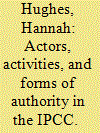

|
|
|
|
|
| Summary/Abstract |
Scholarship on global environmental assessments call for these organisations to become more reflexive to address challenges around participation, inclusivity of perspectives, and responsivity to the policy domains they inform. However, there has been less call for reflexivity in IPCC scholarship or closer examination of how routine concepts condition scholarly understanding by focusing on science and politics over other social dynamics. In this article, I suggest that scholarly reflexivity could advance new analytical approaches that provide practical insights for changing organisational structures. Through reflecting on my understanding of the IPCC, I develop actors, activities, and forms of authority as a new analytical framework for studying international organisations and knowledge bodies. Through its application, I describe the social order of the IPCC within and between the panel, the bureau, the technical support units, the secretariat and the authors, which is revealing of which actors, on the basis of what authority, have symbolic power over the writing of climate change. The fine-grained analysis of organisations enabled by this analytical framework reveals how dominance can and is being remade through intergovernmental relations and potentially, identifies avenues that managers of these bodies can pursue to challenge it.
|
|
|
|
|
|
|
|
|
|
|
|
|
|
|
|
| 2 |
ID:
105935
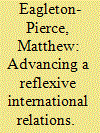

|
|
|
|
|
| Publication |
2011.
|
| Summary/Abstract |
This article advances a call for greater reflexivity in International Relations (IR) to uncover various intellectual and political biases that may obscure the research process. Inspired by existing reflexive practices in IR and, in particular, Pierre Bourdieu's use of such a method, it argues that reflexivity matters for enhancing ethically grounded research, in terms of not only the choice of subjects to study, but also how specific problems are treated, and hence what kind of results can be expected. However, the argument also goes beyond the appeal to autobiographical reflexivity to embrace other dimensions. This includes attention to institutional forces that shape the agency of the scholar and, in turn, the complex relationship between the academy and the wider political world. In the most ambitious sense, the potential for reflexivity can also be conceived collectively in terms of activist intellectuals who seek to reward reflexive practices through dialogue and political intervention. The social space of international trade politics is taken as an empirical example.
|
|
|
|
|
|
|
|
|
|
|
|
|
|
|
|
| 3 |
ID:
097215
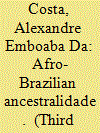

|
|
|
|
|
| Publication |
2010.
|
| Summary/Abstract |
This article 'thinks with' an Afro-Brazilian mobilisation of ancestralidade (ancestrality) as a means to explore, unmask and mark the centrality of 'race' in development. In contrast to thinking about race as cultural difference necessitating inclusion in development, thinking with Afro-Brazilian knowledge aims to rework the very category of development. 'Thinking with' engages critical knowledge emerging out of Afro-Brazilian struggles to forward a theory and practice of substantive political, institutional and social transformation. The article juxtaposes the culturalisms of national ideology and multicultural development policies with ancestralidade as a dynamic political practice that contests capitalism's racialised hierarchies while embodying another sociality of development. An analysis of one cultural centre's efforts to restructure the school curriculum demonstrates that the 'past' of racialised capitalism and ancestral memory are each contemporary projects which evince the relational formation and contested meaning of 'race' in development.
|
|
|
|
|
|
|
|
|
|
|
|
|
|
|
|
| 4 |
ID:
095290
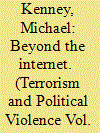

|
|
|
|
|
| Publication |
2010.
|
| Summary/Abstract |
This study challenges the conventional wisdom that the Internet is a reliable source of operational knowledge for terrorists, allowing them to train for terrorist attacks without access to real-world training camps and practical experience. The article distinguishes between abstract technical knowledge (what the Greeks called techne) and practical, experiential knowledge (mtis), investigating how each helps terrorists prepare for attacks. This distinction offers insight into how terrorists acquire the practical know-how they need to perform their activities as opposed to abstract know-what contained in bomb-making manuals. It also underscores the Internet's limitations as a source of operational knowledge for terrorists. While the Internet allows militants to share substantial techne, along with religious and ideological information, it is not particularly useful for disseminating the experiential and situational knowledge terrorists use to engage in acts of political violence. One likely reason why Al Qaeda and other Islamist terrorists have not made better use of the Internet's training potential to date is that its value as a source of operational knowledge of terrorism is limited.
|
|
|
|
|
|
|
|
|
|
|
|
|
|
|
|
| 5 |
ID:
115259
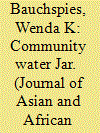

|
|
|
|
|
| Publication |
2012.
|
| Summary/Abstract |
Access to clean water and water transportation systems have been long-standing signifiers of 'modernity.' Current statistics of availability to improved water sources suggest that Guineans are living outside of accepted norms for modern life. This paper explores daily life through the lens of water workers, water collection, water sources and water containers in order to understand the day-to-day reality behind these statistics and to explore the meaning of modern life in urban West Africa. My point of entrance parallels this measurement of 'modernity' and asks how does water arrive in the homes of West African urban families? For a mid-sized West African city there are various pathways that deliver water to households that all involve water workers and technologies: this paper documents and explores them in order to think critically about avenues of development that aim to improve the flow and access to clean water. The research is based upon participant observation, in-depth interviews and surveys of concessions in a mid-sized West African city.
|
|
|
|
|
|
|
|
|
|
|
|
|
|
|
|
| 6 |
ID:
085432
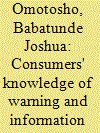

|
|
|
|
|
| Publication |
2008.
|
| Summary/Abstract |
In spite of the efforts to safeguard consumers' health through product regulations, reports revealed that diseases and illnesses due to unhygienic production and consumption are on the increase. This study examined knowledge of consumers about information and warning labels on selected products in Ado Ekiti in southwestern Nigeria. Findings from the study revealed that respondents had average knowledge of information labels on the selected products. Also, a majority of the respondents did not check information on products before purchase and consumption. Chi-square results further showed relationships among some variables tested. The article recommends ways by which higher knowledge could be achieved.
|
|
|
|
|
|
|
|
|
|
|
|
|
|
|
|
| 7 |
ID:
159586
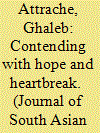

|
|
|
| 8 |
ID:
193124
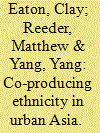

|
|
|
|
|
| Summary/Abstract |
The articles in this special issue examine engagements across ethnic boundaries in Asian cities over the past two centuries. We see these cities as stages for the co-production of ethnicity, where multiple actors, including but not limited to state authorities, have attempted to define, manage, and challenge the social boundaries between their diverse inhabitants. These articles direct our attention to the convergence of three critical themes: the flexibility and ubiquity of ethnic ascription, the top-down and bottom-up co-production of social meaning, and Asian cities as crucial sites of social innovation.
|
|
|
|
|
|
|
|
|
|
|
|
|
|
|
|
| 9 |
ID:
188584
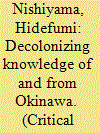

|
|
|
|
|
| Summary/Abstract |
This paper explores the militarized situation of Okinawa Island and the ongoing struggles and challenges that Okinawans continue to confront. Particular focus is placed on how Okinawans challenge dominant colonial forms of knowledge, which assert that the U.S. military presence on the island is beneficial for Okinawan and Japanese people. After contextualizing Okinawa Island within contemporary American imperial geopolitics and outlining the current state of the island, the paper looks at three different, yet closely integrated, ways in which Okinawans, led by activists and progressive local officials, challenge the dominant narrative on the U.S. military. By questioning dominant assumptions about security, a base-dependent economy, and Okinawans’ indigenous status, these movements contribute to the decolonization of knowledge, an important step toward the demilitarization of the island. The paper concludes with a discussion of remaining challenges for decolonial knowledge production.
|
|
|
|
|
|
|
|
|
|
|
|
|
|
|
|
| 10 |
ID:
154786
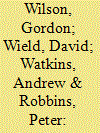

|
|
|
|
|
| Summary/Abstract |
The importance of science in development has been increasingly recognised in development discourses and policy since 2000. Engineering is less visible though engineering and engineers are important for the building and maintenance of transport, water, energy, industrial, informatics, urban and health systems. This article aims to investigate why engineering has not received more emphasis, including why development engineering has not been institutionalised like tropical medicine. It explores the nature of engineering in development, highlights recent efforts to headline engineering for development and, using analyses of what engineers know and do inside international development, suggests that its profile and effectiveness is emerging.
|
|
|
|
|
|
|
|
|
|
|
|
|
|
|
|
| 11 |
ID:
110009
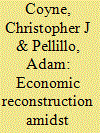

|
|
|
|
|
| Publication |
2011.
|
| Summary/Abstract |
Economic reconstruction typically takes place after the end of war. Yet recently, economic reconstruction has been viewed as a means to 'win hearts and minds' during ongoing conflict. Drawing on a variety of reconstruction experiences from Afghanistan and Iraq, we identify four 'reconstruction traps' that result from the incentives and constraints faced by actors involved in economic reconstruction during ongoing conflict. These traps include: 1. the credible commitment trap, 2. the knowledge trap, 3. the political economy trap, and 4. the bureaucracy trap. Avoiding these traps is critical for successful economic reconstruction; and we discuss potential strategies for doing so.
|
|
|
|
|
|
|
|
|
|
|
|
|
|
|
|
| 12 |
ID:
187740
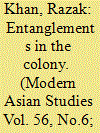

|
|
|
|
|
| Summary/Abstract |
This article examines often ignored ‘minority entanglements’ forged between European Jewish and South Asian Muslim intellectuals in Germany and traces their evolution in colonial India. The article focuses on three individual life histories and situates them within the more extensive Jewish-Muslim intellectual dialogue that resonated in the inter-war period. It brings to light the lives and writings of Josef Horovitz (1874–1931), professor of Arabic at the Muhammadan Anglo-Oriental College, Aligarh, and a prolific contributor to the journal Islamic Culture published in Hyderabad; Leopold Weiss alias Muhammad Asad (1900–1992) in Islamia College, Lahore, who also served as the editor of Islamic Culture, Hyderabad; and educationist and reform pedagogue Gerda Philipsborn (1895–1943) at the Jamia Millia Islamia, Delhi. The intellectual dialogue between minority communities, together with the contribution it made both to modern Islamic studies as a discipline and the forging of a new reform pedagogy, allow us to rethink the Jewish and Muslim question as well as the minority response to it through a comparative perspective. The minor history of European Jewish and South Asian Muslim entanglements makes for a rich testimony to the problems and possibilities of studying minorities as the makers of minor cosmopolitan knowledge.
|
|
|
|
|
|
|
|
|
|
|
|
|
|
|
|
| 13 |
ID:
124121
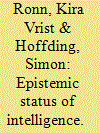

|
|
|
|
|
| Publication |
2013.
|
| Summary/Abstract |
We argue that the majority of intelligence definitions fail to recognize that the normative epistemic status of intelligence is knowledge and not an inferior alternative. We refute the counter-arguments that intelligence ought not to be seen as knowledge because of 1) its action-oriented scope and 2) its future-oriented content. We dismiss the traditional infallibilistic understanding of knowledge and follow David Lewis' argument, that knowledge is fallible and context-sensitive. Thus, we argue for the importance of developing a methodology by which the entitlement, justification and robustness of claims to intelligence-knowledge can be assessed.
|
|
|
|
|
|
|
|
|
|
|
|
|
|
|
|
| 14 |
ID:
141204
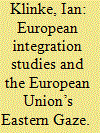

|
|
|
|
|
| Summary/Abstract |
European integration studies has recently seen the first signs of a belated critical turn. While new approaches have started to challenge the way the European Union is conventionally studied, they are yet to investigate in detail the relationship between the academic field and its primary object of study. This article draws on work in critical geopolitics to explore one of the interfaces of academic knowledge on European integration and the world of policy: the Jean Monnet Programme. In highlighting the scheme’s role in the EU’s Eastern geopolitics, it argues that European integration studies resembles other forms of area studies, such as cold war era Sovietology. This comparison elucidates both the field’s long-standing resilience to critical theory and its inability to anticipate the recent crisis of the European project.
|
|
|
|
|
|
|
|
|
|
|
|
|
|
|
|
| 15 |
ID:
137602
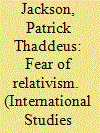

|
|
|
|
|
| Summary/Abstract |
Although scholars toss around the word “relativism” when debating the merits of various methodological approaches in international studies, there is a lack of clarity about what it might mean to have a relativist position on the production of social-scientific knowledge. As a result, a lot of the ink spilled about the potential dangers of relativism is overblown. A little philosophical and logical clarity goes a long way towards dispelling that particular bogeyman.
|
|
|
|
|
|
|
|
|
|
|
|
|
|
|
|
| 16 |
ID:
178046
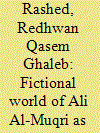

|
|
|
|
|
| Summary/Abstract |
This study aims at highlighting the artistic and intellectual vision of Ali Al-Muqri, a prominent contemporary Yemeni novelist, in The Handsome Jew, a narrative that marks a sharp departure from the works of his contemporaries in terms of its themes, technical devices, and discursive strategies. Much has been written about the relation between Muslims and Jews in the world literature. However, most, if not all, have a masculine stamp. The norm has been reversed here, Fatima, an educated Muslim woman, loves Salem, the Jew, and marries him. In contrast to the derogatory image of the Jew in literature, Salem seems open-minded and very humane. It is hypothesized that all religions are subject to interpretation according to human needs and that all religions are a source of union, not separation. Building on an eclectic theoretical framework with the analytical method, this study analyzes The Handsome Jew that is still incarcerated within the local Yemeni linguistic and cultural barrier and aims to locate the Yemeni narrative in the realm of Arabic and world literature. The conclusions of the study are as follows: despite different religions and cultures, there is a possibility for coexistence and establishing social relationships, as it happened with Fatima and Salem, who introduce a kind of sublime human reconciliation that has not touched the sacred belief of both. Learning the other’s culture and reading freely, away from the preceding and inherited views, is essential for a healthy society. It would make Muslims love the Jews and would make the Jews love the Muslims. Love is a natural humanistic energy that challenges human-made cultural barriers.
|
|
|
|
|
|
|
|
|
|
|
|
|
|
|
|
| 17 |
ID:
096879
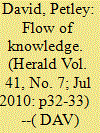

|
|
|
| 18 |
ID:
167461
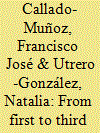

|
|
|
|
|
| Summary/Abstract |
The paper adds to the debate on the relationship between military spending and economic growth by analysing the contribution of a military university centre to regional economic development. It goes beyond traditional economic impact studies by including research related effects and integrating “third stream” activities. Conceptualization and categorization are carried out to thoroughly analyse the different dimensions of knowledge and “third stream” actions. The analysis is performed from its settlement and during its first 5 years of existence which allows showing how the strategy of community engagement is developed. The conclusion suggests that, as traditional military roles extend, and military education institutions become higher education institutions, a comprehensive evaluation should be taken into account to enrich the public debate on government spending.
|
|
|
|
|
|
|
|
|
|
|
|
|
|
|
|
| 19 |
ID:
147321
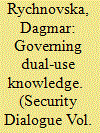

|
|
|
|
|
| Summary/Abstract |
Fears of malicious non-state actors and potentially dangerous research have given rise to new efforts to secure science against misuse. With the rapid advancements of science, what receives attention in security politics is how to oversee not only material and technology but also knowledge. This article explores the emerging security governance of knowledgeable practices in life sciences and critically reflects on its possible implications. The article first contextualizes the current understanding of the dual-use dilemma in life sciences in prior discourse on science–security relations and argues that security concerns have converged with ethical dilemmas related to the governing of science. Drawing on critical theory, security studies and science studies, it then conceptualizes dual use as a problem of organizing circulations and suggests that policing scientific knowledge through the establishment of a ‘culture of responsibility’ can be understood as a part of broader shifts towards the subjectification of knowledge. Using examples from life sciences, the article analyses how practices of knowledge production and circulation are adjusted to the logic of security. The article concludes that the converging political rationalities and governmental techniques of responsible science and security risk management, understood as an ‘ethicalization’ of security, affect the politicization of security expertise, prospects of resistance and the democratic accountability of science.
|
|
|
|
|
|
|
|
|
|
|
|
|
|
|
|
| 20 |
ID:
126035
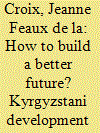

|
|
|
|
|
| Publication |
2013.
|
| Summary/Abstract |
The development industry has moved from concepts of aid and technical assistance to the idea that closing 'gaps' in people's knowledge is the most effective way of alleviating poverty and injustice. My data show the means through which this 'knowledge transfer' is actually supposed to happen. I examine the micro-politics of development: the role and agency of development workers, who are so frequently employed to conduct 'training' on a wide range of topics affecting citizens' well-being, such as conflict prevention or sustainable agricultural practices. This paper draws on ethnographic research between 2010 and 2012 with Kyrgyzstani NGO workers to analyse the 'side-effects' of development, such as the creation of a new social class and softening age hierarchies. I examine the widespread conviction among trainers that education can solve most social ills, and their concepts of how knowledge, sometimes in the guise of ideologiya, shapes people. I argue that this faith in knowledge reflects both the life course of NGO workers themselves and what they can offer from within the 'knowledge transfer' paradigm. An understanding of the friction between different expectations of knowledge content, teaching relationships and aims in creating well-being is not only essential to a critical reflection on these development efforts but also illuminates wider political and social processes and relationships, such as expectations of the state and international community.
|
|
|
|
|
|
|
|
|
|
|
|
|
|
|
|
|
|
|
|
|